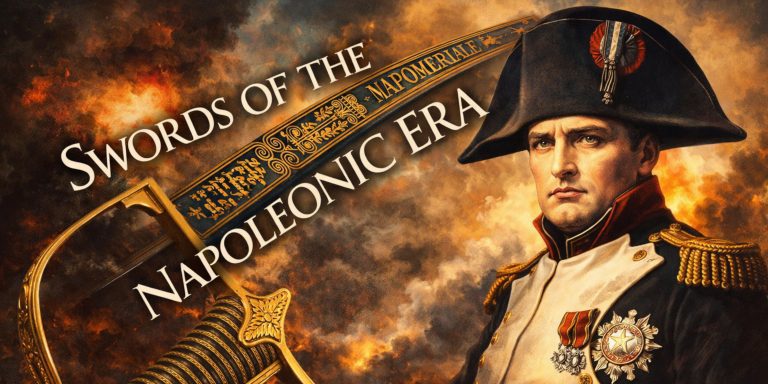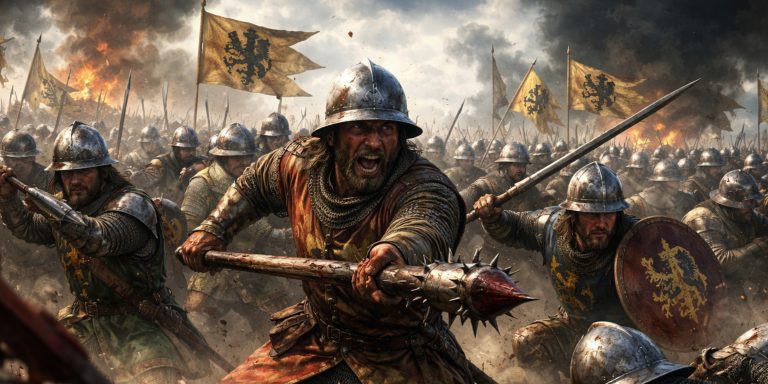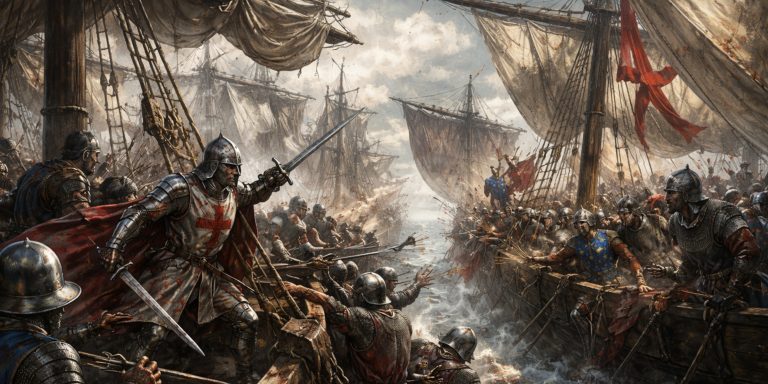
The legacy of swords and combat has left an indelible mark on language, with phrases rooted in medieval warfare, classical literature, and ancient traditions. Below are the origins and historical contexts of expressions still used today.
“Double-Edged Sword”
This metaphor originates from the physical design of blades that cut on both sides, symbolising an action or decision with both beneficial and harmful consequences. The concept appears in classical literature, such as Seneca’s Moral Letters to Lucilius (1st century CE), where he warns of wealth’s dual nature. The phrase gained prominence in English during the Renaissance, reflecting the era’s fascination with paradox and duality.
“Live by the Sword, Die by the Sword”
Drawn from the Gospel of Matthew (26:52), these words were spoken by Jesus during his arrest, admonishing violence as self-destructive. The phrase became a medieval proverb, often cited in sermons and chronicles to critique feudal warfare. Its enduring use underscores the moral ambiguity of retribution, echoing in political and ethical debates to this day.
“Cross Swords”
Derived from duelling traditions, where opponents literally crossed blades, the term evolved into a metaphor for verbal or intellectual conflict. Fencing manuals from the 16th century, such as those by Italian master Achille Marozzo, emphasised the honour and strategy of duels. By the 18th century, the phrase appeared in British parliamentary records to describe heated debates.
“Draw Your Sword”
A literal call to arms in medieval warfare, this phrase signified readiness for battle. Its metaphorical use emerged in political rhetoric, such as in Tudor proclamations urging defiance against invaders. Shakespeare employed it symbolically in Henry V (“Now set the teeth and stretch the nostril wide, Hold hard the breath and bend up every spirit To his full height”), capturing the tension before conflict.
“Fall on Your Sword”
Rooted in Roman antiquity, this refers to seppuku-like suicides by disgraced officials. Historical accounts, such as Plutarch’s Lives, describe generals like Marcus Antonius using their gladius to preserve honour. The phrase resurged in Victorian political discourse, describing public figures resigning over scandals.
“A Pen Is Mightier Than the Sword”
Coined by English playwright Edward Bulwer-Lytton in his 1839 play Richelieu; Or the Conspiracy, the line “Beneath the rule of men entirely great, The pen is mightier than the sword” champions intellectual over physical force. The sentiment, however, echoes earlier thinkers like Euripides, who wrote in The Bacchae: “The tongue is mightier than the blade.”
“Sword of Damocles”
This idiom stems from a Greek legend recounted by Cicero in Tusculanae Disputationes (45 BCE). Damocles, a courtier in Syracuse, envied King Dionysius’ power until the king suspended a sword by a horsehair above his throne, illustrating the peril of rulership. The tale became a Renaissance allegory for the burdens of leadership, later entering common parlance.
“He Who Wields the Sword”
Medieval feudal systems tied authority to martial prowess, encapsulated in the maxim “Qui gladio ferit, gladio perit” (“He who lives by the sword, dies by the sword”). The phrase evolved to signify moral or political authority, as seen in Thomas Hobbes’ Leviathan (1651), which debates the legitimacy of power derived from force.
“Put to the Sword”
A grim phrase from military chronicles, describing the massacre of defeated foes. The Anglo-Saxon Chronicle (9th–12th centuries) uses it to recount Viking raids, while Crusader texts describe the slaughter of Jerusalem’s inhabitants in 1099. Its archaic brutality lingers in historical literature.
“Sworn on the Sword”
Medieval knights swore oaths on blades during dubbing ceremonies, as documented in chivalric codes like the 12th-century Ordène de Chevalerie. This practice symbolised the inviolability of vows, with broken oaths considered tantamount to treason. The phrase persists in legal and ceremonial contexts, evoking unbreakable pledges.
Legacy in Modern Language
These expressions endure as linguistic artefacts of humanity’s martial past. From Roman honour codes to Shakespearean drama, they bridge ancient battles and contemporary conflicts, proving that the weight of a sword extends far beyond its blade.










